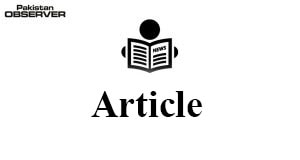HR violations in IIOJK: Threat to regional peace
THE issue of Jammu and Kashmir is the world’s oldest unresolved international conflict, having been on the agenda of the United Nations Security Council (UNSC) since 1948.
The UN Security Council has passed numerous resolutions acknowledging the legitimate right of Kashmiris to self-determination.
This right has been denied by stockpiling an occupation force of over 900,000 troops on behalf of Indian government, making Indian Illegally Occupied Jammu and Kashmir (IIOJK) the world’s most militarized zone.
India’s Illegal and Unilateral Actions of 5 August 2019 invalidated Articles 370 and 35A of the Indian Constitution in an attempt to alter the territory’s demographic structure.
To maintain its unlawful annexation of IIOJK, the Indian government has implemented illegal citizenship regulations in an attempt to alter the population of the disputed area in order to extend its ‘Hindutva’ goal.
According to reports, India has granted over 4.2 million domiciles to Hindus from outside the IIOJK region.
Additionally, the Indian government has enacted new land laws under the Union Territory of Jammu and Kashmir Reorganization (Adaptation of Central Laws) Third Order, 2020″ that allow “citizens of India” to purchase non-agricultural land in IIOJK without ever having a domicile in the occupied territory.
The new citizenship law erodes Kashmiris’ religious, linguistic, and cultural identities and jeopardizes economic opportunities for indigenous Kashmiris.
India’s illegal and unilateral actions on 5 August 2019 were a flagrant breach of United Nations Security Council Resolutions and international law, particularly the Fourth Geneva Convention.
The Indian government has imposed an unprecedented military blockade and limitations on the Kashmiri people’s fundamental rights and freedoms as a result of this horrible act.
To this day, the Kashmiri leadership is imprisoned on bogus charges.Extrajudicial executions, arbitrary arrests and detentions are all still happening.
The practice of Indian occupation forces murdering Kashmiri children in fake “encounters” and “cordon-and-search” operations has become almost routine in IIOJK.
Thousands of people have been held without charges or due process, including children.Arrests of Kashmiri youngsters are also taking place indiscriminately.
A whole slew of draconian legislation, including the Public Safety Act (PSA), the Armed Forces Special Powers Act (AFSPA), and the Unlawful Activities Prevention Act (UAPA), have made these measures legal (UAPA).
Since August 5th, 2019, more than 519 Kashmiris have been killed by Indian Occupation Forces during detention, false encounters, or staged cordon and search operations.
A total of 584 people have been injured by pellets, including individuals who have lost their eyesight.
Even the dead bodies of those killed in fake encounters are not handed over to the families for their burial.
Pakistan has constantly been emphasizing that the Indian occupation troops’ gross and systemic abuses of human rights necessitate an investigation by a United Nations Commission of Inquiry (COI), as recommended by the OHCHR in its 2018 and 2019 reports.
Government of Pakistan has released a dossier on the Indian Occupation Forces’ human rights abuse, war crimes, and crimes against humanity in the IIOJK on September 12, 2021.
The 113 references used in the 131-page document are mostly from foreign or Indian sources.
Since 2014, 3,432 incidences of war crimes have been reported by 118 Indian Army units, according to the dossier.
The Dossier contains information on Indian Occupation forces, including torture of Kashmiri youth in custody, violence against women and children, arbitrary detention and “half widows,” indiscriminate use of pellet guns, cordon and search operations, fake encounters, false-flag operations, and fake arms recovery, as well as efforts to effect demographic change after August 5, 2019.
Several world parliaments, media outlets, and international organizations, including the UN, UNHRC, EU, OIC, have criticized India’s actions in IIOJK.
The UNSC has discussed the Kashmir dispute three times since August 5.He also called on India to stop using pellets against children in IIOJK in his June 2021 report titled “Children and Armed Conflict”.
During his May 2021 visit to Pakistan, UNGA President Volkan Bozkir urged all parties not to alter the status of Jammu and Kashmir, stating that a just solution should be found peacefully in accordance with the UN Charter and relevant UNSC Resolutions.
Parliaments in the EU, US, UK, Sweden, and Portugal have passed resolutions and debated gross and systematic human rights violations in IIOJK.
The Russell Tribunal on Kashmir met in Sarajevo on December 17-19, 2021, to investigate Indian war crimes and crimes against humanity in IIOJK where several Kashmiri witnesses were present.
Human Rights Watch (HRW) also detailed the human rights abuses in IIOJK in its 2021 report.
Amnesty International’s 2020-2021 “State of the World’s Human Rights” report highlighted grave human rights violations by the Indian Government and Occupying Forces in IIOJK.
People of IIOJK have been facing gross human rights violations and economic decline since August 5, 2019.
The situation has severe repercussions for long-term peace and security in South Asia Region.
Pakistan has consistently maintained that this durable peace and security are contingent on the diplomatic solution of all outstanding issues between Pakistan and India, including the core dispute of Jammu and Kashmir, in accordance with international laws as well as the wishes of the Kashmiri people.
The ceasefire agreement signed on 25 February 2021 is consistent with Pakistan’s commitment to preserving peace and alleviating the sufferings of Kashmiris living along the Line of Control (LoC).
India has irrevocably damaged the atmosphere with its illegal and unilateral actions on 5 August 2019, while Pakistan remains committed to peace.
As a result, India is responsible for fostering an environment conducive to meaningful engagement.
Pakistan’s ultimate goal remains a just resolution of the Jammu and Kashmir dispute in accordance with relevant UNSC Resolutions and the wishes of Kashmiri people.
—The writer is a contributing columnist and analyst associated with Islamia University Bahawalpur.










